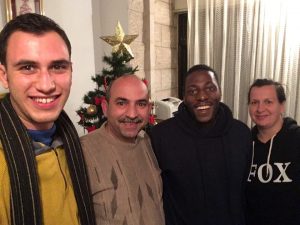Inter-Faith Encounter
In January, Daniel travelled to Israel and Palestine, with a group of Jews, Christians and Muslims as part of the LSE Inter-Faith Encounter. He shares his thoughts on the spiritual, political and religious implications.
It was with apprehension that we first arrived, standing on the Mount of Olives, overlooking the Old City and Jerusalem; it was already interesting to realise the significance that each site meant to us, from our different faith backgrounds.
We visited beautiful and vastly different areas of Israel and Palestine throughout the week; from the beach in Tel-Aviv, which seemed more Western and secularized; to the melting pot of church bells, chants from minarets and ancient pavings in the Old City of Jerusalem; to the more rackety and unorganized areas in the West Bank like Bethlehem; to the more built-up and affluent areas of West Jerusalem (certainly much more diverse than any other country of its size, such as Wales).
These environmental features reflected and helped to build up a picture of the sheer complexities of the Arab-Israeli conflict, and the religious undertones that interweave the various political narratives.
One of the most startling sites was East Jerusalem, which, pursuant to agreements reached by the UN, is Palestinian territory. It was sad to see demolished Palestinian homes, apparently demolished due to the impossibility of being granted housing permits by the Israeli authorities, and the poor economic conditions and over-crowdedness. This became clearer when we visited Aida refugee camp, which maintained Palestinians who had fled their villages during the 1967 War. It really challenged my pre-conceived bias as a supporter of the state of Israel and a two-state solution. Indeed, this was particularly felt when we stayed with a Christian-Palestinian family in Bethlehem, in the West Bank (Palestinian territory), on the last night. I spoke at great lengths to the father, who told me that he does not care about what state he is under, whether it amounts to a one-state or two-state solution, but that all he wants is his dignity back. He told me that they have no hot water (which I found out for myself); they have no pension security; no proper passport (entitled ‘Palestinian Authority’, with great difficulties in obtaining visas); no proper income, paying taxes for health and education services which may be on paper, but aren’t real; no physical security, especially so when the Israeli Defence Force (IDF) infringe the zone A agreement and “cause trouble” in his words; and no freedom of expression, since even peaceful protest may amount to arrests.
All this and more verified to me the real human suffering that there is on the ground- somehow, I, a British citizen, have all these presupposed benefits and rights, yet here stands someone who has little, if any, of the privileges I have. It is too simplistic to form an opinion in the abstract, and bandy words like one-state or two-state solution, without realising that people are suffering, and that solutions involve real people, with very different opinions.
Indeed, it is far too simplistic to surmise the conflict as either pro-Israel or pro-Palestine; Shaul Yudelman, from the organisation Roots, seeks to promote dialogue between Israelis and “the other”, and Palestinians and “the other”; he said that it is unfortunate that “Israelis see all Palestinians as terrorists, and that Palestinians see all Israelis as soldiers”. Antwan Saka, a Palestinian, who was also present in the discussion, remarked that even speaking Hebrew to an IDF soldier can help resolve tensions at checkpoints.
One realizes that much of the religious rhetoric, such as that stemmed from Hamas, is not necessarily from Islamic jihad, but rather the appallingly low socio-economic conditions faced by Palestinians. This was particularly so in relation to the spiritual/pilgrimage element of the trip, which was a time to see “the others” for myself. I found great solace going into Al Asqa Mosque, the Dome of the Rock- to reflect with one’s feet on the sacred matted floor, and to see men prostrated in prayer in the White Mosque in Nazareth, leaving with a meditative and reflective look in their eyes, was an enriching experience. It was also sobering to realise how devout my Muslim brothers and sisters on the trip were, waking up at 4am to go to Al Asqa to pray. Equally, I was very emotional at the Shabbat service in a synagogue in West Jerusalem- seeing so many Jewish people from different ethnicities made me realise that these are God’s chosen people, in their promised land, from near, and from afar. Of course in my own faith, to pray and reflect by the waters of the stunning view of the Sea of Galilee, and realise that this is where Christ walked, was a very uplifting experience, which will not be forgotten.
This describes only half of what we heard and explored on the trip, and I am very grateful to the LSE Faith Centre for this life-changing experience. The most important life-lesson I have gained is to avoid uninformed and broad brush-stroked opinions as far as is possible, such as my former “pro-Israel” narrative which did not fully comprehend both sides. This can be applied to any opinion, whether left or right-wing. Many narratives can be far too simplistic and generalizing; in a decade where polarisation seems more and more prevalent, it is an imperative that we first listen to each other, and respect the different realities and experiences each of us have gone through, and what we can all bring to the table. It was inspiring to end the trip going to the “Hand in Hand” bilingual school in West Jerusalem, where Jewish and Arab children are taught and play together, in both Hebrew and Arabic. No one is born racist, phobic or prejudiced- dialogue with “the other” is an important first step in seeking understanding, and, perhaps, peace.

The last night; staying with our Palestinian Catholic host family






